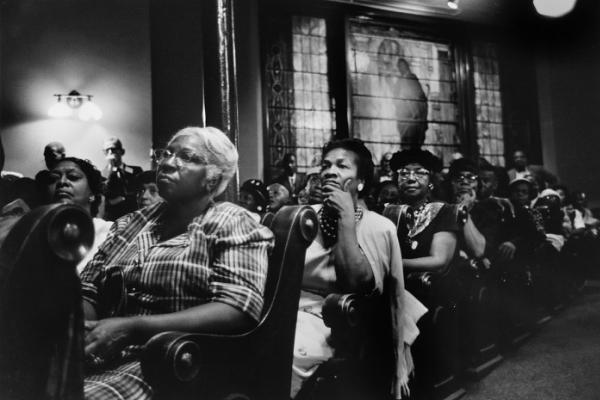I had breakfast with my daddy recently. We talked about all that had happened in the past year, how things were going at Walmart, how hard it was for him to work long hours, and how crazy it has been doing all of this in a pandemic. I was glad to be able to sit down with him. We didn’t really do that too much when I was younger, but the older I have gotten, the closer I've wanted to become.
“Hey daddy,” I asked, “what got you into politics?” He paused. He bent his head over a bit. He shook it side to side. “Those white boys back then tried to lynch my brother,” he said. “That did it.”
I couldn’t say anything. I was stunned. I had known my daddy to be reserved, quiet. He stands 5 feet, 5 inches tall and has a slight limp from spinal surgery. His beard is grey and black, wrapping around his face like the mask he was wearing. And he felt every bit of the words that were coming out of his mouth. His body, which had been relaxed, tensed up. I knew the memory had come back in terrible ways.
“Daddy, as a pastor,” he continued, “really didn’t get involved in politics.” His daddy, who I barely remember, pastored a small Black rural church in Dillon, S.C. “But for us,” he said, recounting his life in the ’60s and ’70s, “for us, we went from colored to Black.”
I knew what he meant. My daddy and so many Black folks like him had gotten tired of a world that saw them as problems and not people. He had gotten so tired of Black lives being terrorized. He had to find a way through the brutality of this country. And he knew that this was the story that I needed to hear.
“Daddy,” I said. “I’m glad you told me that.”
“That’s the only way we have made it,” he told me. Telling stories is the only way.
Something feels different this Black History Month. So many people who have witnessed this country's history are not here to experience it with us. They prayed and they marched and they sang songs and they told stories — and so many of them are gone. How do you remember them? I don’t know if the words that I write or the sermons I preach or the conversations I have will ever be enough to give witness to the souls and bodies of these saints.
So often their lives are reduced to white education, getting white people to “get it,” or getting white people to say their names. But that’s not the value of Black life. Black lives are not lessons to be learned but lives to be liberated. Honoring their stories is about loving Black people, changing the world Black people live in, and giving up the idea that Black people must prove our value. It is about Black power and potential beyond the imposed logic of white supremacist constructions. It is, as Elizabeth Alexander writes, seeing “complex black selves, real and enactable black power, rampant and unfetishized black beauty.”
We cannot observe this month merely by asking, “How can I remember and learn about Black people?” It is all of us asking, “How can we love Black people by seeing them, hearing them, relishing in them, and creating a world where Black people feel loved, inspired, and protected?”
That story, says poet and theorist Fred Moten, is “exhaustive celebration of and in and through our suffering, which is neither distant nor sutured.”
The story I want to tell is this: Black people are human and worthy of love. We are not heroes. We are not villains. We are human, as beautiful as we are terrible. Our lives are not just resistance. Our lives are not just lessons.
Our stories — and our futures — are the ways we have stood up for what’s right and kept on living when dreams were deferred, hopes unrealized, lives lost, and bodies wearied, and our hearts beating fast as our feet moved across red carpets in old churches rejoicing that we are given of life. These stories are our shining joy. They have become gospel to a people bent and broken.
I didn’t want that meal with my daddy to end. I saw in my daddy so much vulnerability and love that I have been longing for over the past few years. He, my momma, and all the Black people in rural South Carolina had been through so much. And they were here. Sharing meals. Sharing stories. Raising children. Going to sleep. Getting up again. Failing. Loving. Healing. Hurting. Being human.
They’ve been teaching us to listen deeply to the voices of our history. To never have too much faith and to never give up faith. To never let pain have the last word while never forgetting the pain in their bones. To never forget, ever. To let us know liberation and love are our right and responsibility.
And I am thankful because though many are gone, many are still here, and we have their stories and our own. Making and living and breathing history. That is the revelation, our showing, our beauty, our testimony, our witness. That is what they are: witnesses to the miracle of Blackness.
Got something to say about what you're reading? We value your feedback!






